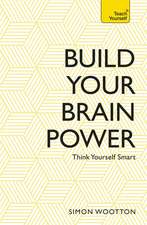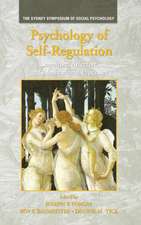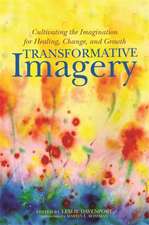Thinking Twice: Two minds in one brain
Autor Jonathan St B. T. Evansen Limba Engleză Hardback – 30 sep 2010
Preț: 402.21 lei
Preț vechi: 583.87 lei
-31% Nou
Puncte Express: 603
Preț estimativ în valută:
76.96€ • 80.56$ • 64.06£
76.96€ • 80.56$ • 64.06£
Carte tipărită la comandă
Livrare economică 19-25 martie
Preluare comenzi: 021 569.72.76
Specificații
ISBN-13: 9780199547296
ISBN-10: 0199547297
Pagini: 252
Dimensiuni: 162 x 241 x 22 mm
Greutate: 0.56 kg
Editura: Oxford University Press
Colecția OUP Oxford
Locul publicării:Oxford, United Kingdom
ISBN-10: 0199547297
Pagini: 252
Dimensiuni: 162 x 241 x 22 mm
Greutate: 0.56 kg
Editura: Oxford University Press
Colecția OUP Oxford
Locul publicării:Oxford, United Kingdom
Recenzii
Thinking Twice offers a fascinating interdisciplinary tour of the human mind ... It challenges the current fashion that upholds the power of intuitive thinking as well as the common-sense view that we are in complete charge of our actions we perform. Evans' explication of "two minds in one brain" uses abundant up-to-date, eye-opening, readable examples ranging from neuropsychology to social psychology. It is the very book that both general readers and professionals would enjoy reading.
This book is the best case currently available for the dual process theory. A reader of Thinking Twice will find that Evans strikes just the right balance between readability and conceptual rigor. I strongly recommend this book to anyone, whether a psychologist or not, who is interested in the dual process theory.
This book is the best case currently available for the dual process theory. A reader of Thinking Twice will find that Evans strikes just the right balance between readability and conceptual rigor. I strongly recommend this book to anyone, whether a psychologist or not, who is interested in the dual process theory.
Notă biografică
Jonathan Evans is Emeritus Professor of Psychology at the University of Plymouth. He has conducted a major experimental research programme into human reasoning and judgement since the 1970's and has authored seven previous books and well over 150 scientific articles on these topics. He has played a major part in the development of the dual process theories of higher cognition and is one of the principal architects of the two minds theory which is the focus of this book











